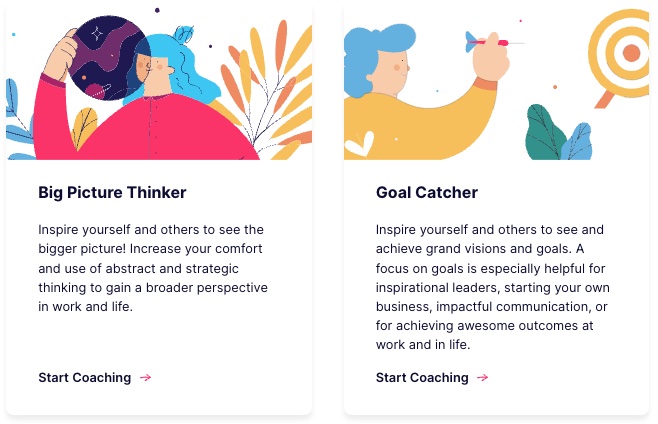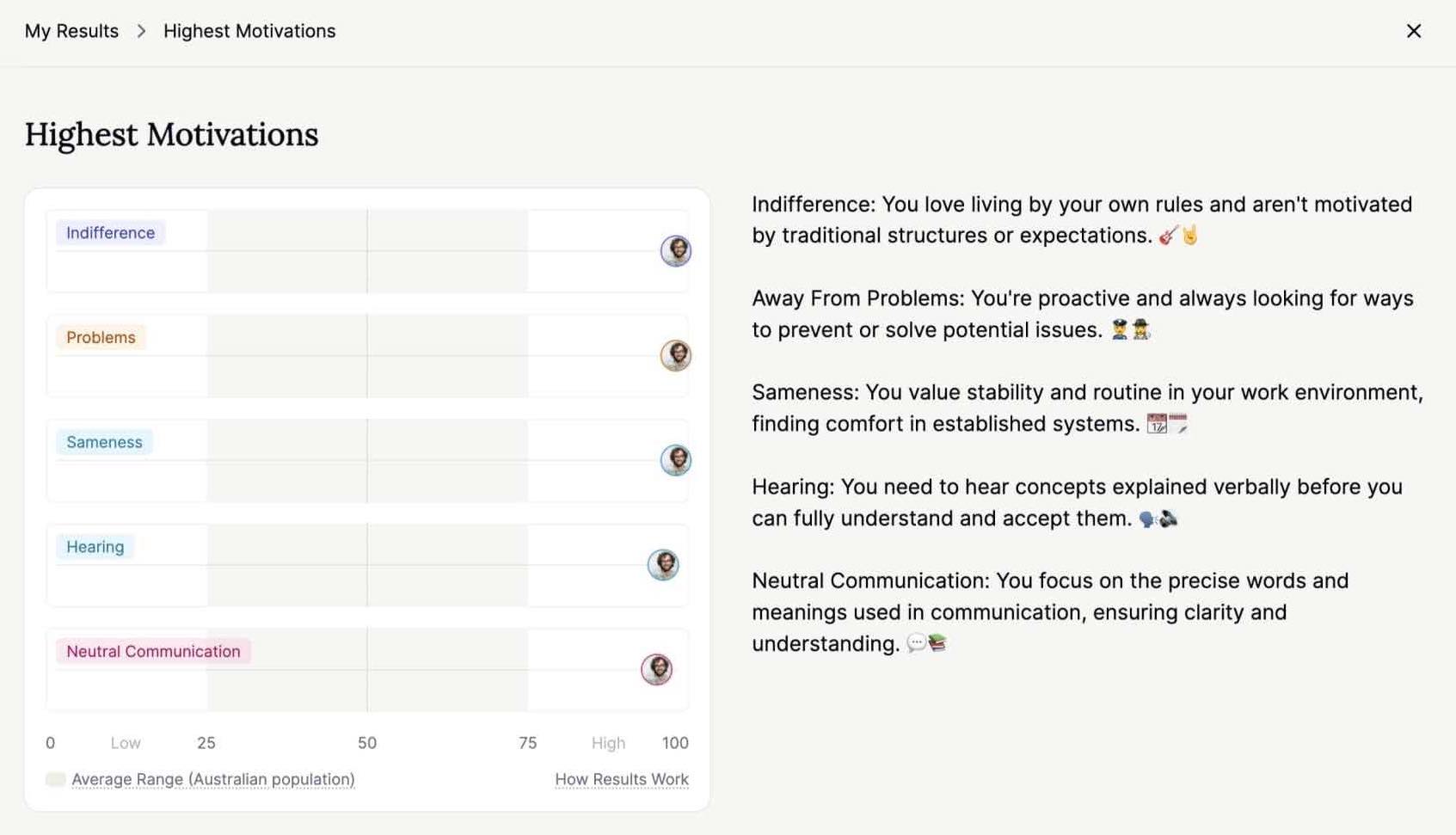Executive coaching: Unlock 788% ROI for leaders at every level
Whether you’re already in the C-suite or on your way up, executive coaching is your best-kept secret for workplace success. Discover how this powerful tool can help you become more empathetic, strategic, and effective when navigating the many leadership challenges.
- Author
 Emma Norris
Emma Norris

What is executive coaching?
In order to define executive coaching, it's important to first understand how coaching works in general. Delivered by trained experts, this science-backed methodology helps leaders achieve their goals through personalized guidance. It can also involve developmental training in core workplace skills, such as interpersonal awareness, strategic planning, or decision making.
You might be wondering, 'What's the difference between coaching vs mentoring?' Unlike working with a mentor, a coach typically won’t provide direct advice or training based on their experience. Rather, the coaching perspective is to ask reflective questions and support the client in the right direction — empowering them to reach their own powerful conclusions.
There’s certainly an important place for both coaching and mentoring, and the two modalities can complement each other to build out your 'board of advisors' in the workplace.
However, a coach is best for business leaders with specific areas or career goals they'd like to work on, while a mentor suits those looking for general support and guidance.
So, how is executive coaching different from regular coaching? Sometimes referred to as leadership coaching, it involves focusing on the skills and responsibilities of executives and other senior leaders. For example, executive coaching sessions are less likely to focus on how to be productive in day-to-day work, and more on how to make big-picture decisions that move the organization forward.
One common misconception about executive coaching is that it's reserved for those at the top of their organizations, who have thousands to splash on leadership development initiatives. While this was once the case, the industry is changing. Now, thanks to scalable coaching solutions like Marlee, people at all levels can access guidance to develop their executive presence in future roles.

Marlee's online coaching programs support more than 1,000 different goals
Unlocking your potential: The benefits of executive coaching
Research has found that executive coaching has an astounding 788% return on investment inside companies.¹ Establishing a coaching culture supercharges progress towards organizational goals in a number of ways, including:
Increased self-awareness
Whether indecisiveness or a tendency to be emotionally reactive, we all have blind spots that can sabotage our professional progress. An executive coach can help gently bring these to the forefront, so you can reach your next stage of growth.

Marlee's Individual Results Board showing the highest motivations
Enhanced leadership skills and decision-making
The higher you ascend the career ladder, the more consequential your decisions become. Working with an executive coach will sharpen your instincts and help you achieve better outcomes.
Increased work-life balance and job satisfaction
Executive roles can be incredibly demanding. An executive coach can help you find a sustainable approach to productivity that’s tailored to your unique work style, so you can achieve more in less time.
Improved emotional intelligence
Relationships are everything in the workplace, and that’s especially true in the C-suite. Research shows that coaching facilitates better emotional intelligence and interpersonal communication in 70% of clients.²
Increased confidence
It's much easier to try new things and take leaps when you have a confidante and guide who always has your back. Indeed, research shows that 80% of leaders who undergo coaching experience greater self-confidence.²
Career advancement and organizational impact
Not sure where you want to go in your career, or what your leadership style should be? Working with an executive coach can help you delve deeper into what’s important to you, so you can make more aligned decisions.
How to find the right executive coaching program
The competitive advantages of executive coaching are undeniable at both an individual and organizational level. However, not all coach practitioners are created equal. To find the right solution for your specific needs, there are several decisions you'll need to make. These include:
Individual vs. team coaching programs
You may choose to work with a coach as an individual as part of your personal development journey. However, it's also possible to find coaches who work with entire teams to empower them to work more effectively together. This may be delivered via group coaching sessions or individual coaching engagements.
Our AI, Coach Marlee, offers the best of both worlds by conducting one-on-one coaching sessions and by providing insights at a team level (for example, identifying affinities and areas of difference amongst the group).
In-person vs. virtual coaching options
Traditionally, executive coaches would visit organizations to conduct in-person coaching sessions. However, the advent of virtual conferencing technology and the rise of remote working have made virtual coaching far more commonplace. While face-to-face interaction certainly has its advantages, online coaching can be much more convenient for busy professionals. They can slot in sessions at a time and place that is convenient for them. This can take place via video coaching or async communication.
Human coaching vs AI coaching
While there's no substitute for human interaction, AI coaching has emerged as a scalable and accessible solution for leadership development. As the world's very first AI coach, Marlee harnesses 20+ years of human wisdom to deliver personalized coaching programs based on your unique working style. Trained on thousands of hours of client coaching, Marlee provides tailored guidance for any workplace scenario that may arise. And, the results speak for themselves, more than 90% of our users achieve their goals in just 4-9 weeks.
Find an executive coaching provider with the right experience and credentials
It's also important to find an executive coaching provider with the right experience and credentials that align with your long-term goals. There are many different types of coaching, and what works for one person may not work for another.
These coaching services may not always come under the label of an executive coach, so it pays to keep an open mind. For example, if you're an aspiring entrepreneur who wants to start your venture, what you may be looking for is business coaching. Or, if you're looking to transition into leadership roles in a completely different industry, career coaching may be a better fit for you.
When selecting executive coaching services, it's wise to do your due diligence. Unfortunately, the executive coaching industry is largely unregulated. This means that anyone can call themselves a coach, whether they have 20 years of training and advanced degrees, or are straight out of high school. With no clear ethical guidelines to abide by, coaching abilities vary greatly.
Today, it's far too easy for so-called 'coaches' to lure prospective clients in with flashy branding and websites, but very little substance to back it up.
Red flags to look out for when assessing executive leadership coaching services include bold claims about their income, with no clear information as to how they reached that annual revenue. Making vague claims such as 'helping you achieve the freedom lifestyle' should also ring alarm bells.
Some questions you can ask a provider to help gauge their coaching skills include:
- What coaching certification programs or coach-specific training have you undergone?
- How many years of experience do you have in the (relevant) industry?
- How many coaching clients have you previously worked with?
- What coaching methodologies do you use in your work/What are some of your favorite coaching techniques?
- Can you share some testimonials from previous coaching clients?
- What coaching outcomes have previous clients achieved?
Another great way to find a trustworthy provider is to ask for a referral from someone you trust or look at databases such as the International Coaching Federation (the world's most globally recognized coaching certification body).
At Marlee, we also have a directory of professional coaches who have been hand-selected for their expertise and high level of training. You can book a free introductory session.
How to get the most out of the executive coaching process
So, you've found your perfect executive coaching partner and are excited to start achieving your career goals. However, it's important to note that coaching isn't a magic bullet. It's not enough to turn up to your sessions and hope that business success will fall in your lap. Like anything, you get what you put into the executive coaching process. Here are some practical strategies you can use to maximize the impact of coaching:
Adopt a growth mindset
Sometimes, your coach may tell you things that you don't necessarily want to hear. This can be challenging if you're not accustomed to receiving feedback. However, these fresh perspectives may be exactly what you need to fuel your personal growth. To get the most from your coaching, it's crucial to develop a growth mindset.
As one of the key principles of coaching, this is when you believe you're capable of change and can learn from mistakes. This is in contrast to a fixed mindset, which views skills, personality, and intelligence as unchangeable.
Do your homework
There may be instances where you are given coaching assignments to complete. It's important to take these seriously! Yes, it can be hard to fit into an already busy schedule, and it may make you feel like you're back in school. But in most cases, you're given this practical work for a good reason. It's one thing to absorb coaching content, but it's another to put the lessons into action in the real world. If you're consistently finding it difficult to complete the activities, it might be worth flagging this with your coach so they can reassess the workload.
⏱️ If you prefer a more low-maintenance yet equally effective approach to coaching, Marlee's online coaching sessions are delivered in just 5 to 10 minutes per day with no additional work to complete.
Keep track of progress outcomes
Whether it's SMART goals or the COACH model, your coach will likely have their preferred method for setting and tracking objectives. While it's their role to stay on top of your development plans, ultimately coaching is a client-driven process. It's important to take action between sessions and to come prepared to give progress updates on what you accomplished during the week.
Navigate common challenges
In an ideal world, the executive coaching process would always be smooth sailing, but that's not always the case. You may have times when you don't agree with your coach, and that's completely natural. At the end of the day, trust and transparency are the cornerstones of a good coaching relationship. If something isn't working for you, it's important to talk to your coach about it so you can find a solution together.
You might find yourself in a situation where you are tasked with running your organization's coaching program for senior leaders. This comes with its own set of unique challenges. For example, you might find that your executive coaching engagement varies between individual contributors on your team. Some people may be enthusiastic about the professional development opportunities in front of them, while others may frequently miss sessions.
It's important to have internal processes in place for progress tracking, so you can identify employees who are disengaged with coaching. However, this is less likely to occur with Marlee, as coaching is delivered in a way that is targeted specifically to each employee's work and communication style, leading to better outcomes for leaders.
One of the other biggest challenges in running executive coaching programs is measuring the ROI, so you can communicate its value to key stakeholders. While there's no one proven way to track the efficacy of leaders, key business measures to monitor include productivity, employee retention, and overall business performance.
Marlee's Over Time Board makes it easy to measure the effectiveness of your coaching program by tracking the progress of your employees over time, in relation to key performers in your field.
Use executive coaching to level up both individual and team performance
Canva is the perfect real-life example of a company that has deeply embedded coaching into its organizational culture. The fast-growing design firm uses Marlee alongside its internal coaching department to nurture its people, including senior leaders. One strategy they have used to maximize the benefit of their coaching practice is to incorporate Marlee into onboarding.
"Recently, we had a new People Partner start, who inherited 11 direct reports," says Canva's Internal Coaching Lead Sarah Nanclares, who pioneered the program.
So, I was able to walk her through the platform and say, 'Let me show you the team you've walked into.' By showing — not telling — your executive team what coaching can do for them, you're far more likely to get the relevant stakeholders on board. You can tell when certain people are on the fence about it, but once we bring it to life for them and iron out any questions or wrinkles they might have, they love it.
By uncovering blind spots and unlocking greater business success, executive coaching can become your most powerful leadership acceleration strategy, just like Canva.
Get started for free with Marlee by answering questions on what motivates you 🚀
Frequently asked questions
Who is a good candidate for executive coaching?
Anyone who wants to become more influential in the workplace can benefit from executive coaching. This includes current leaders who have been at the executive level for a while but want to achieve continued success in the workforce. It also includes first-time leaders who need additional support to work through personal challenges. No matter where you're at in your career journey, coaching will be a key tool to improve future performance outcomes.
What are some other types of coaching?
The most common type of coach that people are familiar with is a sports coach — who provides guidance on and off the field to help athletes function more effectively. However, there are a wide variety of other coaching types. These include business coaches, relationship coaches, career coaches, money coaches and fitness coaches.
Another popular option for leaders is a high-performance coach. It's not uncommon for people in high-level CEO roles to work with a few of these professionals at any given time!
References
1. Anderson M, 2001, 'Executive Briefing: Case Study on the Return on Investment of Executive Coaching,' MetrixGlobal, https://gvasuccess.com/articles/ExetutiveBriefing.pdf
2. International Coaching Federation, 2009, 'ICF Global Coaching Client Study April 2009,' International Coaching Federation, https://researchportal.coachingfederation.org/Document/Pdf/abstract_190


